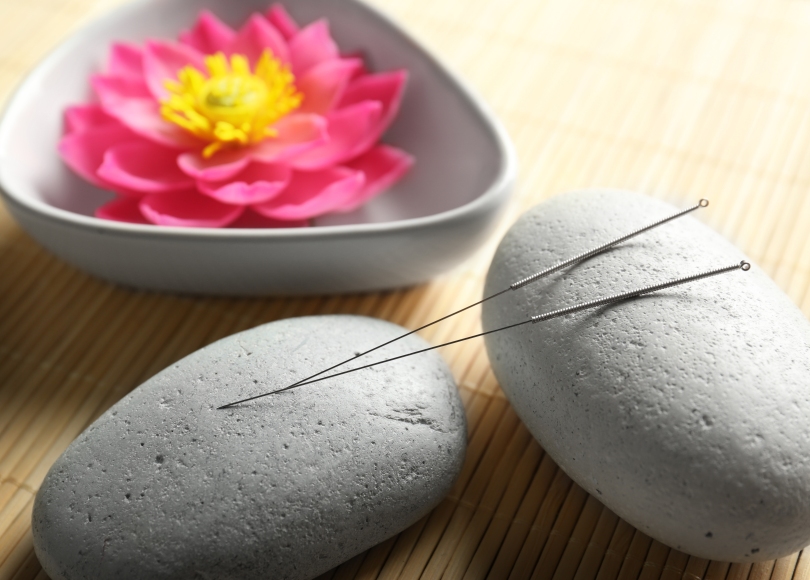Acupuncture is a form of traditional Chinese medicine that studies show may help with many of the symptoms and side effects of cancer and cancer treatment.
There’s strong evidence to support some of the ways that acupuncture is used in cancer care, and less solid, but encouraging evidence for other uses that are continuing to be studied.
People dealing with cancer often seek acupuncture for relief from pain, which can be a side effect of certain treatments or can be caused by the cancer itself.
In the last few years, there have been more randomized clinical trials that have added to the evidence on how acupuncture can help in relieving pain for individuals being treated for cancer. We’ll look at a few of those in this post.
Acupuncture as a Complementary Therapy
Let’s start with a quick overview. (The information in this section is from the National Cancer Institute’s Acupuncture PDQ-Patient Version.)
Acupuncture is a part of traditional Chinese medicine in which needles, heat or other treatments are applied to places on the skin called acupuncture points to control a variety of symptoms.
Studies of acupuncture as a complementary therapy to relieve cancer symptoms and side effects treatment have been done in the U.S., China and other countries.
The strongest evidence for the benefits of acupuncture is from clinical trials on the use of acupuncture to relieve nausea and vomiting.
Acupuncture has also been studied for its ability to relieve numerous other symptoms and side effects of treatment including pain, hot flashes, fatigue, dry mouth, lymphedema, sleep problems and numerous others. Many of the studies have shown that treatment with acupuncture either improves symptoms or keeps them from getting worse.
Side effects from acupuncture are minimal but there can be problems if done incorrectly or with needles that are not sterile. The National Certification Commission for Acupuncture and Oriental Medicine certifies acupuncture practitioners and most states require this certification.
Acupuncture in Cancer-Related Pain Management
Studies on the ability of acupuncture to relieve pain from cancer and side effects of treatment have had mixed results in the past due to small sample sizes and problems with the design of the studies.
But in recent years, more randomized clinical trials have been conducted and many have found acupuncture to be helpful in relieving different types of cancer and treatment-related pain, including these:
Joint Pain from Aromatase Inhibitors: Aromatase inhibitors are used in the treatment of both metastatic and early stage breast cancer that is hormone-receptor positive. But these drugs can cause joint pain that is sometimes severe. A large randomized, controlled trial involving 226 women with joint pain from aromatase inhibitors found that women receiving acupuncture reported lower pain that women in control groups. Findings from the SWOG 1200 trial were first reported in December 2017.
Peripheral Neuropathy: A randomized clinical trial reported in 2020 enrolled 75 patients with various types of cancer including breast cancer and colon cancer who had moderate to severe chemotherapy-induced peripheral neuropathy (CIPN). The trial found that, compared with usual care, acupuncture resulted in significant improvement in CIPN symptoms.
Cancer Pain (Various Types): A study published in 2019 analyzed results from 17 randomized clinical trials of acupuncture and acupressure for cancer pain management. The trials involved over 1,000 participants dealing with various types of pain and a mix of cancer diagnoses. This analysis found that acupuncture and/or acupressure was significantly associated with reduced pain and decreased use of drugs to relieve pain.
Obtaining Acupuncture Treatment
Acupuncture is available at many cancer centers. But it is expensive, with fees generally ranging from $60 to $120 per session. Some health insurance plans cover it but many do not.
A recent survey of oncologists found that the primary barrier to referring patients for acupuncture was cost. The oncologists said that insurance coverage was inconsistent and that some patients are unable to receive acupuncture treatment due to income or not having insurance coverage. (The survey was part of a study on the sustainability of providing acupuncture and Chinese medicine in oncology treatment presented by Susan Veleber at the 2021 annual meeting of the Society for Integrative Oncology.)
There is solid evidence of the benefits of acupuncture in cancer care. Oncologists should not have to refrain from referring their patients to receive acupuncture because of the cost. Acupuncture should be available and accessible to anyone receiving cancer treatment who needs it.
If you enjoyed this post, thank you for sharing it!
Related Posts
Medical Cannabis: How Can it Help in Cancer Care?
Choosing Complementary Therapies for Breast Cancer
Image credit: Africa Studio via Shutterstock
